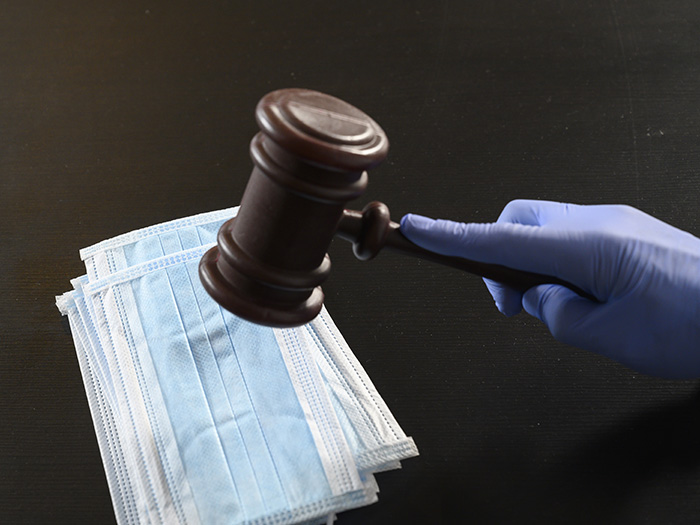COVID-BI Coverage Is Coming Down to Policy Language. How Courts Are Scrutinizing Every Word

Can the COVID-19 virus cause “direct physical loss” to an insured business thus triggering coverage under a commercial business interruption policy of insurance?
That is the question percolating through state and federal courts across the country, with no clear answer.
Initial court cases overwhelmingly answered in the negative, resulting in an insurance industry narrative that COVID-19 business interruption losses cannot be recovered under the terms of most commercial property insurance policies.
But recently, policyholders have experienced wins in courtrooms across the country, proving pandemic related claims are not one-size fits all.
A Business Interruption Review
Commercial business interruption policies often contain business income coverage, which is intended to help a business recover expenses and replace lost income when a covered loss forces the business to shut down. Business income coverage generally requires that a business suspension be caused by a “direct physical loss” caused by or resulting from a covered loss.

Karen D. Fultz-Robison, of counsel, Sheehe and Associates
Insurers have argued that COVID-19-related business losses are not covered by commercial policies, because physical alteration or structural damage is required to trigger coverage from a “physical loss.”
Many courts have agreed with this position, expressly rejecting the proposition that a physical loss can include economic impacts unaccompanied by physical alteration to the property.
Moreover, these courts have rejected the proposition that the presence of the COVID-19 virus on surfaces can cause such required structural impact, explaining that even where COVID-19 is alleged to be physically present on a surface, it cannot satisfy the “direct physical loss” requirement, because the virus does not cause an actual change or alteration to the insured property.
As the court in Social Life Magazine Inc. v. Sentinel Ins. Co. Ltd. expressed, the coronavirus “damages lungs. It doesn’t damage printing presses.” Trans. at 5:3-4, No. 20 Civ. 3311 (VEC) (S.D.N.Y. May 14, 2020).
Recently, however, courts in New Jersey, Missouri, Virginia, and North Carolina have agreed with policyholders that COVID-19 can cause the “physical loss” required by policies to trigger coverage.
Why COVID Cases Are Having Their Day in Court
The difference in these rulings lies not in the approach but in jurisdictional interpretations of the physical loss requirement.
These jurisdictions rejected the notion that only a tangible physical alteration of the insured property can establish physical loss and held that physical loss can occur when a business cannot physically use its covered property, even absent structural destruction.
These courts have analogized the danger of COVID-19 to cases where coverage was upheld when asbestos, toxic air particles or noxious gas rendered a property uninhabitable or dangerous because of non-structural sources.
Bolstering this position is the plain language of many policies requiring “direct physical loss or direct physical damage.” Often these terms are undefined by a policy, requiring courts to give terms their ordinary meaning.
When ascribing ordinary meaning, courts have viewed the conjunction “or” as requiring “physical loss” and “physical damage” to connote different conditions. Applying this logic, while the ordinary meaning of “physical damage” might reasonably require a physical alteration, “physical loss” must refer to a different condition.
Accordingly, courts have concluded that “physical loss” could reasonably occur when a property becomes unusable or unsuitable for a particular purpose and that “physical loss” can denote a non-structural impairment.
Another COVID BI Allegation That’s Found Traction
The majority of these favorable rulings for insureds came at the motion to dismiss stage and therefore have been met with only cautious optimism.

Johanna Sheehe, attorney, Sheehe and Associates
But recently, in North State Deli, LLC, et al. v. The Cincinnati Insurance Company, et al., the North Carolina Superior Court ruled in favor of the policyholder on summary judgment, concluding that the policy at issue provided coverage for the plaintiff’s business losses related to coronavirus governmental shutdown orders. Case No. 20-CVS-02569 (N.C. Gen. Ct. Justice, Durham Cnty.)
The court concluded that a “direct physical loss” as described in the policy includes scenarios when business owners “lose the full range of rights and advantages of using or accessing their business property,” precisely as the plaintiff business owners in that case alleged.
Looking Ahead
Although recent coverage victories are limited, they provide a potential roadmap for businesses that seek to challenge their coverage denials.
Unfortunately, while businesses find arguments in favor of coverage compelling, particularly in cases where the plaintiff alleges the presence of COVID-19 within the insured property and the policy provides coverage for “physical loss or physical damage,” trial courts examining business interruption policies are constrained by stare decisis within their jurisdiction.
For this reason, litigation regarding coverage disputes will likely proceed to courts of appeal for consideration of the issue of coverage and the scope of the phrase “physical loss.”
Insurers are closely monitoring decisions concerning business interruption coverage across the country.
Following the SARS outbreak of 2003, many insurers introduced exclusion clauses for communicable diseases and epidemics/pandemics, many of which are the subject of litigation regarding the current pandemic.
Given the litigation regarding the phrases “physical loss” vs. “physical damage,” carriers might take this opportunity to clarify the bounds of business interruption coverage and perhaps capitalize on the distinction between them by offering explicit coverage endorsements for losses stemming from a non-structural impairment.
While litigation concerning policies in place during the pandemic will no doubt continue, businesses should carefully consider the language of future business interruption coverage to determine if the security they seek is in fact contemplated by their policy. &










